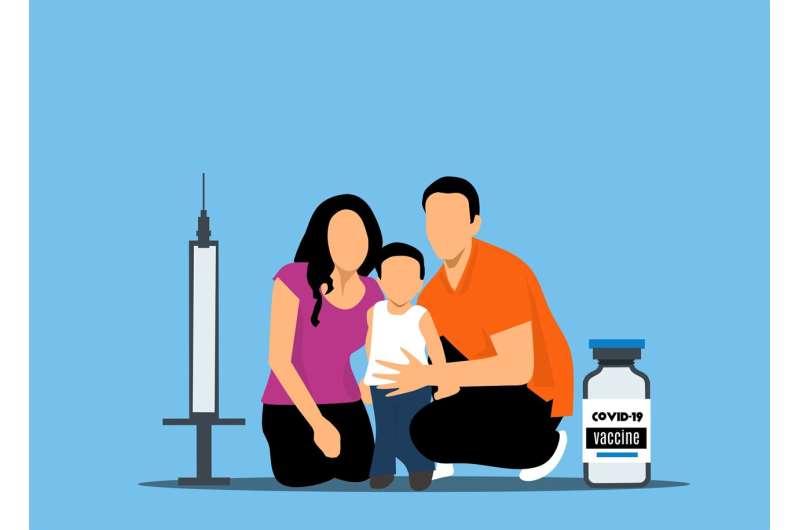This article has been reviewed according to Science X's editorial process and policies. Editors have highlighted the following attributes while ensuring the content's credibility:
fact-checked
peer-reviewed publication
trusted source
proofread
What persuades parents to vaccinate their children?

In the last few years, rising vaccine hesitancy levels have contributed to decreased vaccination coverage for common pathogens in the general population, and specifically among minors. During the COVID pandemic, the debate on childhood vaccination was particularly heated and polarized.
A survey experiment conducted during the pandemic by, among others, Bocconi scholars Chiara Chiavenna, Alessia Melegaro, and Maria Cucciniello, shows how the provision of information can have small to null effects in changing parents' minds about vaccinating their children.
The authors recruited 3,633 adult participants in Italy and 3,314 in the U.K. One-third of them, randomly chosen, received information about the hazard of COVID to children, one-third received information about the contribution of child vaccination to herd immunity, and one-third—a control group—received neutral information about the vaccine.
The goal: assessing the effectiveness of such information in promoting childhood vaccination among parents (asked about the intention to immunize their children) and non-parents (asked about the propensity to suggest the vaccine to parents). The results are published in the journal Vaccine.
"The results confirmed that one-shot informative interventions are hardly effective," said Dr. Chiavenna, a Research Fellow working at the IMMUNE project, "and that parents are more difficult to persuade than non-parents. Furthermore, even in a pandemic, appeals to consider the common good, in this case the herd immunity, are largely ignored."
Parents turned out to be deaf to the herd immunity argument both in Italy and in the U.K., with no statistically significant change in opinion after receiving information about the contribution of childhood immunization to the well-being of the community.
Italian parents showed some sensitivity to information about COVID risks for children: Among those informed about the issue, the share of parents strongly against vaccination decreased by 29.6% in the risk treated group, and the proportion of neutral parents increased by 45%. In the U.K. the reaction was milder and not statistically significant.
Non-parents moved along a different trajectory. The risk argument was ineffective in Italy and mildly effective in the U.K. Information about herd immunity cut the share of non-parents against vaccinating minors by 20% and raised by 21.4% the share of those in favor in Italy, while only reducing the percentage of those against vaccination in the U.K., with non-significant effect on the share of those strongly in favor.
"Our findings suggest that different concerns may come into play when evaluating the opportunity of vaccination for one's own child, as opposed to children in general," said Prof. Melegaro, Principal Investigator of IMMUNE, "and testify the importance of carefully assessing the efficacy of messages' formulation for a specific audience before implementing public health campaigns."
Data showing that parents report a high level of trust in health professionals both in Italy (70%) and in the U.K. (83%) suggest engaging them in information campaigns about child vaccines.
More information: Chiara Chiavenna et al, Personal risk or societal benefit? Investigating adults' support for COVID-19 childhood vaccination, Vaccine (2023). DOI: 10.1016/j.vaccine.2023.05.017



















